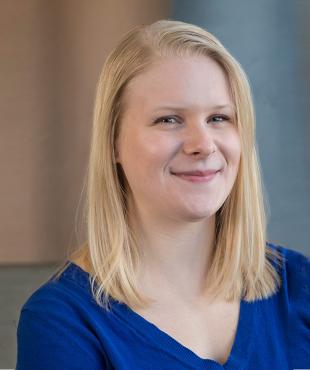
Callie Freitag
Examining how state-level policy decisions affect household economic stability
A past administration student who has a BS in applied mathematics from George Washington University, Callie Freitag was inspired as an undergraduate by the work on health care in developing countries by Harvard professor Paul Farmer and she thought she would study epidemiology. But after attending a biostatistics camp, she decided that she would focus on the social determinants of health, rather than medicine and treatment.
While at an internship with the U.S. Department of Health and Human Services Budget Office during her senior year, working alongside Presidential Management Fellows and several Crown Family School graduates, she decided that she wanted a research career studying the impact of social policies on low-income individuals and families.
After graduation, Callie continued to work in D.C. and researched schools of social work. She found that Crown Family School’s flexible and integrated curriculum was best suited to her interest in mixing theory and practice and in particular, gaining clinical experience and understand political theory in the process of creating policy.
The Crown Family School Admissions office offered Callie a research assistantship, one of only about a dozen available each year, and connected her with (former) Assistant Professor Heather Hill to work on research about how state-level safety net policies affect the economic stability of low-income households. Callie was tasked with collecting data on state policies for the TANF, SNAP, Medicaid/CHIP, and Child Care and Development Fund (CCDF) programs. In fall 2013, she started by coding all relevant state-level policies. She researched published information about policy specifics and tracked down information from federal resources that were not readily available. “My time in Washington, D.C. was a huge asset,” Callie says.
The theory behind the research project was that instability is potentially worse than a stable low income for families. Hill was interested in whether state-level policy choices, such as the length of waiting periods for particular benefits, influenced family economic stability. For example, if a mother lost her job, how long did it take before the safety net programs that she was accessing were taken away, and how soon could she access them again once she regained employment? Each policy was evaluated by looking at: whether it offered transitional benefits to families, hassles to acquire particular safety net benefits, how often families had to recertify their eligibility, and what state policy choices could have led to more stability.
“I felt lucky working on the project,” Callie says. The data that she collected was combined with family-level information from the U.S. Census Bureau’s Survey of Income and Program Participation (SIPP) to examine how state-level policy decisions affect household economic stability. Callie stayed with the project throughout that summer.
In addition to working on Hill’s research project, Callie gained clinical knowledge and skills both in the classroom and at her first-year field placement at The Teen Parenting Service Network at UCAN, [which provides services to youth in the Illinois child welfare system and their families]. “I’m working with pregnant and parenting youth in foster care on their educational and vocational goals. UCAN, like Crown Family School, has a client-centered, trauma-informed orientation to care. My field instructor, Alexis Trocki, AM ’10, is an Crown Family School alumna, so we’re able to talk about how to apply concepts we learned at Crown Family School to our work with clients,”says Callie. “Specific classes that were instrumental in my learning-process include the second quarter of the first-year policy foundation course. It helped me put names to concepts like “agenda setting” that I had seen but never thought about systematically. The direct practice foundation class was also critical for helping me develop clinical skills that are useful not only with clients, but with coworkers and in policy negotiations as well,” she adds.
Freitag is hoping to get an applied policy research job and then apply to a doctoral program in public policy or economics. “I love what I’m researching,” she says, “and I’m now absolutely sure that a research career is what I want to do.”